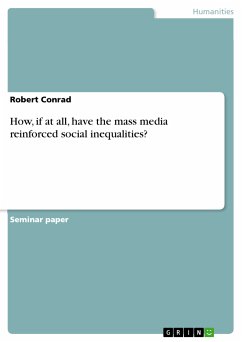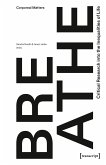Seminar paper from the year 2002 in the subject Sociology - Media, Art, Music, grade: 17 of 20, University of Aberdeen (Department of Sociology and Anthropology), course: Introductory Sociology 2, language: English, abstract: Why do sociologists have to deal with mass media? Mass media is a big part of modern societies. It seems to be omnipresent and therefore has an impact on societies. It influences and changes society, it favours and it discriminates certain groups of the society. The effect on the audience is not arbitrary but dependent on issues of strong interest for sociology namely, class, gender, social context, ethnicity but also other factors like age and sexuality. Since the 1960s media research expanded to examine the effects on the audience and its feedback. In this essay we will examine how the mass media reinforces social inequalities. To do this we will take a brief look at what kind of social inequalities existed in the era before the appearance of the mass media. Then the way of how the mass media reinforces these existing social inequalities today, towards the way in which minorities will be treated. Moreover the focus of this essay will shift to how different groups of people can approach the mass media in terms of its access. Finally this text will give a brief outlook to the possible future development will be presented in its outlines. In addition to that lopsidedness will be avoided by portraying not only the incriminatory theories that affirm the reinforcement of social inequalities through the media like the functionalist theory or the Marxist′s point of view but also some imposing views. ′Media′ is the plural word of ′medium′. "A medium is a means of communication such as print, radio or television. The mass media are defined as a large-scale organization which use one or more of these technologies to communicate with large numbers of people." (Marshall 1996: 313). ′Social inequalities′ are "unequal rewards or opportunities for different individuals within a group or groups within a society" (Marshall 1996: 313). We have to be very critical with that definition otherwise we can find an unjust treatment for every person and therefore everybody would be unequally treated. [...]








